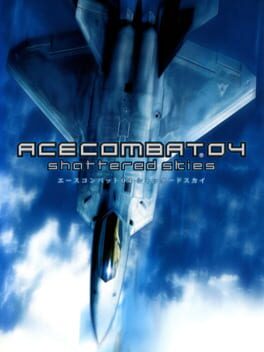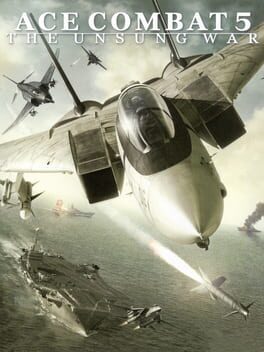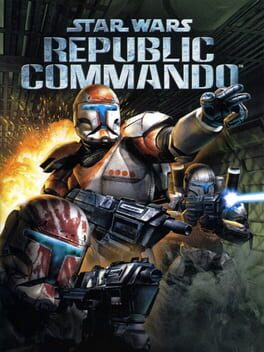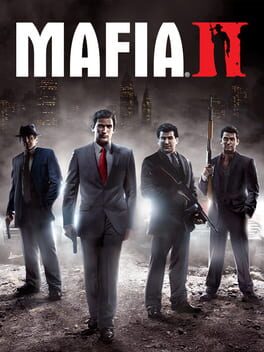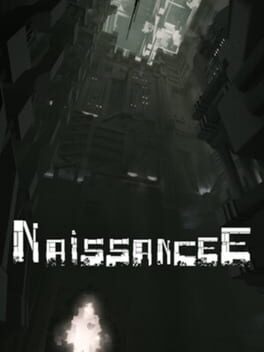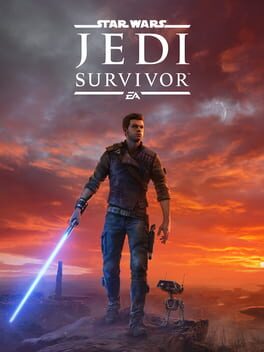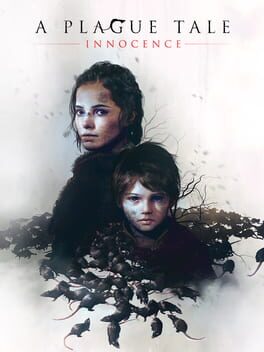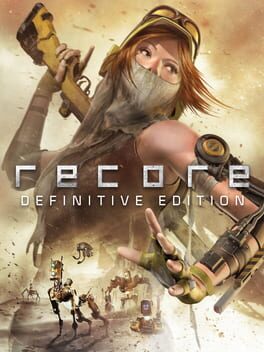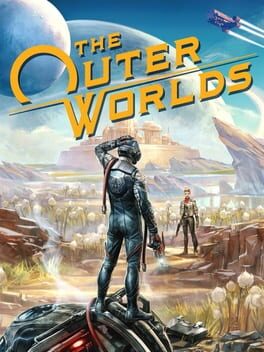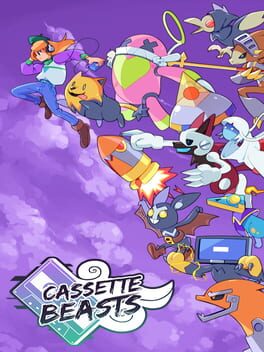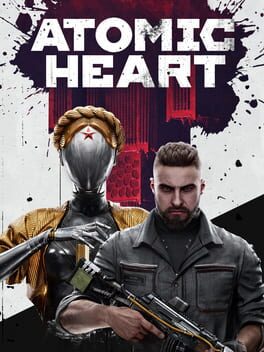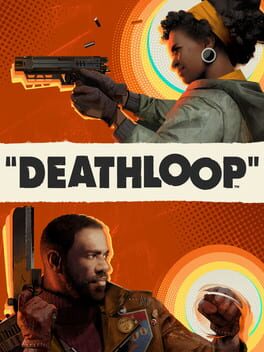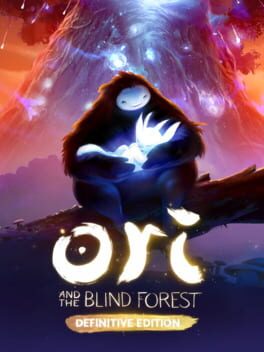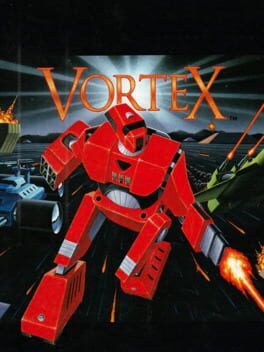Detectivefail
22006 Reviews liked by Detectivefail
I feel like the story on this game is kinda cheesy looking back on it, the twist was pretty good and I love some parts though. The last quarter of the story is just amazing. The content in the game makes up for it, tons of missions and planes for you to select. One of the big selling points were that you are a squadron leader this time, awesome concept but I feel like this isn't that well implemented.
Very unique Star Wars game, I always liked games like this and the Battlefront series that took you to the point of view of a soldier in the galaxy. For Republic Commando I never finished the campaign till now, just finally found the time.
The only real problem I had with this game is that the main rifle you have doesn't do much damage especially against tougher enemies. Though one of my favorite weapons is the vibroblade, I find myself using it a lot because it can insta kill basic enemies(B1 Battledroids for example).
The squad tactics and commands work for the most part. I recommend giving the sniper and anti-armour positions it's super efficient and your allies never run out of ammo. However I feel like there should be more depth with this feature, such as giving your squad mates one of pickup weapons. Although I like the levels I feel like they should have put more areas in the game.
As for the multiplayer side of things I was not able to find a game, it seems pretty dead. Though what I have seen from it looks decent fun. I think they missed a big opportunity with this mode, they should have made something like a "Counter Strike" mode where the Commandos are the counter terrorists and have to disarm a bomb. While the Trandoshans are part of the terrorists and have to arm the bomb.
Overall, Republic Commando has a really good atmosphere to add to the franchise. I think it's a shame the never got its sequel.
The only real problem I had with this game is that the main rifle you have doesn't do much damage especially against tougher enemies. Though one of my favorite weapons is the vibroblade, I find myself using it a lot because it can insta kill basic enemies(B1 Battledroids for example).
The squad tactics and commands work for the most part. I recommend giving the sniper and anti-armour positions it's super efficient and your allies never run out of ammo. However I feel like there should be more depth with this feature, such as giving your squad mates one of pickup weapons. Although I like the levels I feel like they should have put more areas in the game.
As for the multiplayer side of things I was not able to find a game, it seems pretty dead. Though what I have seen from it looks decent fun. I think they missed a big opportunity with this mode, they should have made something like a "Counter Strike" mode where the Commandos are the counter terrorists and have to disarm a bomb. While the Trandoshans are part of the terrorists and have to arm the bomb.
Overall, Republic Commando has a really good atmosphere to add to the franchise. I think it's a shame the never got its sequel.
Mafia II
2010
Most of my issues with Mafia II come down to this:
As a movie, it does a decent job of integrating various influences into one without making the beats feel stale. As a game, it gives those influences a little more time to shine than a movie would, but, more often than not, it fails to use its medium to deliver something that a movie could not.
This is not a criticism delivered at the feet of Mafia II so much as it is an indictment of almost every Open World crime game in the wake of Grand Theft Auto III, including Rockstar's very own. While comparisons to L.A. Noire are more apt in this case with the historical setting and uneasy mixture of linear and open world designs, it's undeniable where it gets many of its ideas for gameplay. Especially where structure is concerned, Mafia II is nearly as linear as a Rockstar game; it just lacks the unintentionally hilarious strictness. However, as with L.A. Noire, this is an especially relevant criticism, given that the subject matter opens itself up more to non-linearity. If an espionage-themed RPG could work, I fail to see why one centered around gangsters can't. Hell, a version of Cyberpunk 2077 that drops the cyberpunk setting in favor of 1930s Chicago would be fucking GOATed. Mafia III almost counts, and had its development been less troubled, I might consider it a worthy successor. Other than that, I guess Empire of Sin gets close, kind of?
Judging Mafia II on the merits of what it is and not what it could be, this is a pretty solid game all around! It's decently atmospheric with great period-appropriate music, its visuals have mostly (surprisingly) held up, vehicles feel fun to control, and outside of how tiresome cover shooting can get, combat is really fun! All the weapons pack a punch, but the revolver and shotgun steal the show here. Hands down, this probably has one of the best shotguns I've ever seen in a game. It is incredibly satisfying to wipe out waves with that thing. The one thing that I do sort of have to note is that the aim assist can sometimes be too lenient on a controller, to the point where the difficulty in some setpieces becomes absolutely trivial. But damn if it doesn't feel good in conjunction with that boomstick. When you aren't shooting at guys, the melee combat system is actually a blast to use. If I were to make a serious Grand Theft Auto comparison, I'd say that this has a more punchy, less janky fist-fighting system than any of those games. The melee system is put to use pretty brilliantly in a prison-themed chapter—which is also a good springboard to talk about something less positive. Some of the stuff in Mafia II is YIKES. Being truthful and unsentimental about history is a balancing act that, when done well, can bring a surprising amount of insight and revelation into a time period. If you want a fantastic example of this, Mafia III is one of the ballsiest fucking big-budget games ever made, and it will probably remain that way for at least another decade. Mafia II, on the other hand, struggles to teeter the line between showing intolerance for the sake of historical accuracy and uncomfortably indulging in it at times. Racial stereotypes stand out the most, but I'd argue that the women in this game's cast aren't spared, either. If there's a woman that's not a motherly figure to your main character or your sister, she's a sex worker. I would almost consider this critical of the lifestyle portrayed, pointing out its shallow nature without saying too much. But the game also lets you collect Playboy pin-ups with the intent of them being 'cool, vintage collectibles!' without a hint of irony or self-awareness, and I'm... conflicted. If the treatment of women in Mafia II is supposed to highlight criticisms of its male characters, it only ends up coming off as slipshod in execution. If nothing else, I can at least say that I'm glad that the team that remastered this was conscious of these mistakes, and put a disclaimer about it in their version of the game. If none of this bothers you, or you're able to appreciate a fine game while staying critical of its more scrupulous aspects, go have fun! But if any of what I've described puts you off, I don't blame you.
Other than that, though, I had a lot of fun with this! I've technically played through its first half more than once, but that gives me all the more reason to say that I still enjoyed what was here. Again, I wish it played to the strengths of the medium a little more, but whatever.
As a movie, it does a decent job of integrating various influences into one without making the beats feel stale. As a game, it gives those influences a little more time to shine than a movie would, but, more often than not, it fails to use its medium to deliver something that a movie could not.
This is not a criticism delivered at the feet of Mafia II so much as it is an indictment of almost every Open World crime game in the wake of Grand Theft Auto III, including Rockstar's very own. While comparisons to L.A. Noire are more apt in this case with the historical setting and uneasy mixture of linear and open world designs, it's undeniable where it gets many of its ideas for gameplay. Especially where structure is concerned, Mafia II is nearly as linear as a Rockstar game; it just lacks the unintentionally hilarious strictness. However, as with L.A. Noire, this is an especially relevant criticism, given that the subject matter opens itself up more to non-linearity. If an espionage-themed RPG could work, I fail to see why one centered around gangsters can't. Hell, a version of Cyberpunk 2077 that drops the cyberpunk setting in favor of 1930s Chicago would be fucking GOATed. Mafia III almost counts, and had its development been less troubled, I might consider it a worthy successor. Other than that, I guess Empire of Sin gets close, kind of?
Judging Mafia II on the merits of what it is and not what it could be, this is a pretty solid game all around! It's decently atmospheric with great period-appropriate music, its visuals have mostly (surprisingly) held up, vehicles feel fun to control, and outside of how tiresome cover shooting can get, combat is really fun! All the weapons pack a punch, but the revolver and shotgun steal the show here. Hands down, this probably has one of the best shotguns I've ever seen in a game. It is incredibly satisfying to wipe out waves with that thing. The one thing that I do sort of have to note is that the aim assist can sometimes be too lenient on a controller, to the point where the difficulty in some setpieces becomes absolutely trivial. But damn if it doesn't feel good in conjunction with that boomstick. When you aren't shooting at guys, the melee combat system is actually a blast to use. If I were to make a serious Grand Theft Auto comparison, I'd say that this has a more punchy, less janky fist-fighting system than any of those games. The melee system is put to use pretty brilliantly in a prison-themed chapter—which is also a good springboard to talk about something less positive. Some of the stuff in Mafia II is YIKES. Being truthful and unsentimental about history is a balancing act that, when done well, can bring a surprising amount of insight and revelation into a time period. If you want a fantastic example of this, Mafia III is one of the ballsiest fucking big-budget games ever made, and it will probably remain that way for at least another decade. Mafia II, on the other hand, struggles to teeter the line between showing intolerance for the sake of historical accuracy and uncomfortably indulging in it at times. Racial stereotypes stand out the most, but I'd argue that the women in this game's cast aren't spared, either. If there's a woman that's not a motherly figure to your main character or your sister, she's a sex worker. I would almost consider this critical of the lifestyle portrayed, pointing out its shallow nature without saying too much. But the game also lets you collect Playboy pin-ups with the intent of them being 'cool, vintage collectibles!' without a hint of irony or self-awareness, and I'm... conflicted. If the treatment of women in Mafia II is supposed to highlight criticisms of its male characters, it only ends up coming off as slipshod in execution. If nothing else, I can at least say that I'm glad that the team that remastered this was conscious of these mistakes, and put a disclaimer about it in their version of the game. If none of this bothers you, or you're able to appreciate a fine game while staying critical of its more scrupulous aspects, go have fun! But if any of what I've described puts you off, I don't blame you.
Other than that, though, I had a lot of fun with this! I've technically played through its first half more than once, but that gives me all the more reason to say that I still enjoyed what was here. Again, I wish it played to the strengths of the medium a little more, but whatever.
NaissanceE
2014
An absolute masterpiece. it's possibly the best game of all time, and certainly the most important one for me. The usage of lights and shadows, of organic and technical forms, horrifying sounds, animations that can be elated or deeply indifferent, places of transit, a grand sense of scale, the most considered use of color, the different pacing of sections, the artificial mystery - all of it has never been matched by anything else, and not because everything else is bad, but NaissanceE is just so good.
One point is especially important though - while I put it on a similar level as Transistor, it has a special connection to games: It could never be anything else. Other games could be adapted to have less gameplay or even be just a movie or a book. NaissanceE has no other option but to be a game, it could not work by just describing or passively viewing an exploration of the world, as it can be seen in the often-referenced BLAME! series. And even then, it doesn't have any overt gameplay.
If you're interested in video games as an art form, playing this is mandatory. And it's incredibly exciting to see the author working on a new game...
One point is especially important though - while I put it on a similar level as Transistor, it has a special connection to games: It could never be anything else. Other games could be adapted to have less gameplay or even be just a movie or a book. NaissanceE has no other option but to be a game, it could not work by just describing or passively viewing an exploration of the world, as it can be seen in the often-referenced BLAME! series. And even then, it doesn't have any overt gameplay.
If you're interested in video games as an art form, playing this is mandatory. And it's incredibly exciting to see the author working on a new game...
Way too glitchy at launch. Get that right out of the way. That was the main de-tracker to this title. I imagine in time this won't be a problem.
Outside of that, some of the best Star Wars content in years! Respawn knocked it out of the park on all the things they plussed up from Fallen Order. Exploring the worlds in fun. Finding new gear is exciting! All the enemies types are varied and fun. There were a few instances in which it felt like the game throws too many enemies at you. That got more into frustration territory rather than challenging. Some of the platforming puzzles could've used a little polish as well.
But man. What a game. I genuinely enjoyed the story. The game somehow throws 10+ new characters at you and makes then likable, interesting and varied.
Outside of that, some of the best Star Wars content in years! Respawn knocked it out of the park on all the things they plussed up from Fallen Order. Exploring the worlds in fun. Finding new gear is exciting! All the enemies types are varied and fun. There were a few instances in which it felt like the game throws too many enemies at you. That got more into frustration territory rather than challenging. Some of the platforming puzzles could've used a little polish as well.
But man. What a game. I genuinely enjoyed the story. The game somehow throws 10+ new characters at you and makes then likable, interesting and varied.
I came back to Cal Kestis journey with some slight trepidation, I enjoyed the previous game but felt it dragged in a couple places and frustrated me in others. I'm happy to say I'm very glad I decided to re-join the Mantis crew, this is a thoroughly enjoyable game, movement feels fluid and extremely satisfying, combat is sufficiently difficult while still making you feel like you really are crossing sabers with formidable foes, and the story and characters are incredibly well written, this outpaces Episode IX's clumsy pacing by a huge margin. Highly recommended to those who played through Cal's previous outing, fans of Star Wars and anyone who knows just how damn good Respawn are at designing levels that are a joy to traverse.
Great game with a strong theme throughout and fantastic gameplay.
The visuals and settings are incredibly immersive with great use of horror tropes. Voice acting is great and adds a lot to general gameplay sections.
Enemies always feel tough and the stealth mechanics are predictable and feel fair, allowing you to engage properly with the game instead of getting frustrated for being caught by seemingly omniscient NPCs.
I would say this game is perfect for the first two thirds but in the final act a combination of an overly supernatural plot, too much explanation to solve that plot, and new gameplay powers turned me off a bit. At the start of the game, you play as sister and brother fleeing from an unknown mystic plague while navigating the horrors of medieval war. By the end, you are the god-king rat master taking on the world. It felt a little odd, but did not takeaway from the overall positive gaming experience.
This game is an absolute masterpiece and I can't wait to get into the sequel.
The visuals and settings are incredibly immersive with great use of horror tropes. Voice acting is great and adds a lot to general gameplay sections.
Enemies always feel tough and the stealth mechanics are predictable and feel fair, allowing you to engage properly with the game instead of getting frustrated for being caught by seemingly omniscient NPCs.
I would say this game is perfect for the first two thirds but in the final act a combination of an overly supernatural plot, too much explanation to solve that plot, and new gameplay powers turned me off a bit. At the start of the game, you play as sister and brother fleeing from an unknown mystic plague while navigating the horrors of medieval war. By the end, you are the god-king rat master taking on the world. It felt a little odd, but did not takeaway from the overall positive gaming experience.
This game is an absolute masterpiece and I can't wait to get into the sequel.
Recore has some cool ideas, a metroid prime like where you have companions that allow you to transverse in interesting ways in the world and in its dungeuns, a fair combat system and a interesting start to it's narrative as well.
And then it comes, the executive, the "ceo" that goes into the dev room and says "this game HAS to be a open world, it's the current industry tendency, no matter what" and congrats, you ruined a potential good game, not only it's open world is boring, it also blocks your progress throughout the main path that was good and the consequence of this is making the game launch a total disaster.
In the end a good ideia, a good beginning destroyed by someone who clearly had no idea what the game was, a shame really.
And then it comes, the executive, the "ceo" that goes into the dev room and says "this game HAS to be a open world, it's the current industry tendency, no matter what" and congrats, you ruined a potential good game, not only it's open world is boring, it also blocks your progress throughout the main path that was good and the consequence of this is making the game launch a total disaster.
In the end a good ideia, a good beginning destroyed by someone who clearly had no idea what the game was, a shame really.
The Outer Worlds
2019
This was a perfectly adequate game. It didn't do anything groundbreaking or change the formula but it wasn't horrible either and tbh that's what we need. In a time where every video game needs to either be a massive blockbuster title or a small humble indie (that still breaks records), The Outer Worlds fills in that gap—the not quite megasuccess triple a but they actually have a budget.
And I didn't know how much I missed these kinds of games until I finished The Outer Worlds. There's a huge lack of them now, if you have a budget you automatically must be a groundbreaking AAA or gamers without a brain will descend upon you for producing a game that's just good.
Aside from that, I did find the jokes and the aesthetics to be a bit much after awhile. Don't get me wrong it's very funny but at some point, it became cartoonish.
And I didn't know how much I missed these kinds of games until I finished The Outer Worlds. There's a huge lack of them now, if you have a budget you automatically must be a groundbreaking AAA or gamers without a brain will descend upon you for producing a game that's just good.
Aside from that, I did find the jokes and the aesthetics to be a bit much after awhile. Don't get me wrong it's very funny but at some point, it became cartoonish.
Cassette Beasts
2023
This is probably my favorite pokemon inspired game I have played and I've played a lot of the big ones, nexomon extinction, temtem, coromon etc. What makes this better than all of those in my opinion, is that its what most resembles pokemon for me, but isn't afraid to improve where pokemon doesn't/won't, whereas sometimes in the other games it feels like they hold back in certain areas or make the same mistakes pokemon does. The main example of this is the gameplay flow for Cassette Beasts, its very similar in structure to Scarlet and Violet where there is a mostly open world map, and you have 2-3 core objectives to complete in order to beat the game. It even has unlocking overworld abilities to help you progress the map like SV does but its implemented better here imo. And overall that gameplay flow is done better here thanks to firstly the map design and secondly the level scaling implementation.
I'll start with the map design. While the game is marketed as open world, its not really, but in a good way. You are meant to do the right side of the map first until you complete enough of it to travel to the left side, and how you progress through that right hand side and what order you complete objectives is up to you. This is where the level scaling comes in. At the start of the game you are giving choices in how the scaling will be implemented, for example will bosses scale down to you, how will enemy AI move in the overworld etc. This level of tweaking is fantastic as it allows you to essentially make a custom easy/normal/hard mode, a sorely lacking pokemon feature. This is what truly helps the game flow, as you never feel over or under leveled, I left it on the default settings and while I never truly struggled like say in TemTem at times, I also couldn't just blindly mash away like you often can in pokemon and SV (depending on your order). I also really liked how none of the objective locations are just given to you immediately on the map, you either have to find them yourself or have an npc in town tell you as a quest, its a nice touch for those into exploration.
In terms of beast designs, I liked a lot of them, I feared that the roughly 120 count wouldn't be enough but it is and they are distributed well throughout the map. I also like the sticker move system and the star system for evolving, it makes having a rotating squad very feasible. The fusion mechanic is also cool, the algorithm used is very good in that it never feels like the fusions are just slapped together like the default pokemon fusions.
If I had any gripes, its that I wasn't a fan of how the companions quests are generally tied into a handful of the main objective boss fights, which means for about half of the Archangel fights you have a companion with you that can't fuse until you do the fight. Not a big deal but it came up as an annoyance once or twice. The other gripe is the awkwardness of swapping around beasts, especially if you want to take a beast off a companion to give them a fodder one if you are swapping, you should be able to remove your active beast from the tape inventory menu rather than having to back out to the party specific menu, it just becomes a hassle if you find yourself swapping companions a lot, which you will have to do some amount of due to the quests.
Overall, thoroughly impressed with this two person dev team and I'm glad its on gamepass as that should help with discovery a lot and even on steam its a very fair price of €/$20 I believe. If you are a fan of monster catching games, this is one to try.
PS the music is very good but sadly theres only maybe a handful of tracks, would have liked a few more but at least what we have is good so you don't mind hearing them often.
I'll start with the map design. While the game is marketed as open world, its not really, but in a good way. You are meant to do the right side of the map first until you complete enough of it to travel to the left side, and how you progress through that right hand side and what order you complete objectives is up to you. This is where the level scaling comes in. At the start of the game you are giving choices in how the scaling will be implemented, for example will bosses scale down to you, how will enemy AI move in the overworld etc. This level of tweaking is fantastic as it allows you to essentially make a custom easy/normal/hard mode, a sorely lacking pokemon feature. This is what truly helps the game flow, as you never feel over or under leveled, I left it on the default settings and while I never truly struggled like say in TemTem at times, I also couldn't just blindly mash away like you often can in pokemon and SV (depending on your order). I also really liked how none of the objective locations are just given to you immediately on the map, you either have to find them yourself or have an npc in town tell you as a quest, its a nice touch for those into exploration.
In terms of beast designs, I liked a lot of them, I feared that the roughly 120 count wouldn't be enough but it is and they are distributed well throughout the map. I also like the sticker move system and the star system for evolving, it makes having a rotating squad very feasible. The fusion mechanic is also cool, the algorithm used is very good in that it never feels like the fusions are just slapped together like the default pokemon fusions.
If I had any gripes, its that I wasn't a fan of how the companions quests are generally tied into a handful of the main objective boss fights, which means for about half of the Archangel fights you have a companion with you that can't fuse until you do the fight. Not a big deal but it came up as an annoyance once or twice. The other gripe is the awkwardness of swapping around beasts, especially if you want to take a beast off a companion to give them a fodder one if you are swapping, you should be able to remove your active beast from the tape inventory menu rather than having to back out to the party specific menu, it just becomes a hassle if you find yourself swapping companions a lot, which you will have to do some amount of due to the quests.
Overall, thoroughly impressed with this two person dev team and I'm glad its on gamepass as that should help with discovery a lot and even on steam its a very fair price of €/$20 I believe. If you are a fan of monster catching games, this is one to try.
PS the music is very good but sadly theres only maybe a handful of tracks, would have liked a few more but at least what we have is good so you don't mind hearing them often.
Atomic Heart
2023
Atomic Heart deserves the numerous controversies and criticisms lobbed at it, but it is a fascinating experience nonetheless. Each contrived narrative beat, confusing line of dialogue and striking aesthetic choice rests anywhere between inspired, baffling, or completely unhinged.
The protagonist is obnoxious, foul-mouthed and never stops talking, the game is ripe with sexual iconography and uncomfortable explicit scenes, and a majority of the cinematics look stiff and robotic. Yet when the game's most compelling visual moments are front and center, it is unforgettable.
I started Atomic Heart passionately despising the main character’s childish arguments with his talking glove. But by the end I found myself listening carefully whenever the two delivered long-form exposition regarding the narrative conflicts, with some end-game arguments in particular really catching my ear.
I also started the game uncomfortable by the protagonist's complete passiveness towards the situation unfolding around him (robots murdering everyone), with him and his A.I. companion spouting all sorts of mindless propaganda that (I assumed) was played too straight to be an intentional aspect of the narrative. But by the end, I cannot help but respect how hard the writers went into the extremity of the main character's brainwashing, regardless of how much of an idiot he is.
And I cannot even for a second begin to unravel the obsession with sex in Atomic Heart. What the fuck was with what vending machine? Why did they make that character so gross and weird? In the same vein, I was expecting to despise the Twins due to their male-gazey design and the bizarre manner in which they move about, but by their second cinematic, I was completely on board witnessing an overlong ritual depicting a monstrous ceremony reminiscent of eldritch horror. That cutscene had my eyes widened and jaw dropped for four minutes straight. I will never forget it.
Is Atomic Heart's story poorly told and executed? Absolutely! Was I gripped throughout every moment of it, attentively listening to each conversation and enjoying the various bits of (admittedly bizarre) worldbuilding? Yes, I did! As a result, I cannot comment on the whether or not I like this story. I could probably say I'm fond of it, but I don't think I ever will be able to come to a definitive conclusion. I came away from the game speechless.
My speechlessness is (obviously) no result of excellency: A majority of the performances lack emotional poignance, certain elements of the open-world design are lackluster and the story is probably really bad in actuality (regardless of how much its strangeness makes me fond of it). Certain fights frustrated me, climbing is super janky, there are tons of weird bugs and dumb ways to get stuck, the main character is immensely annoying, and some side content feels repetitive. The ending is also terrible, quickly undoing the few good things this script accomplishes.
But Atomic Heart is also full of stuff I wholeheartedly love. Mick Gordon's soundtrack is phenomenally thrilling, enhancing the tension of each gunfight tenfold, alongside a great use of classic Russian music (and their respective remixes). Environments boast an intoxicating abstract beauty, enemies move and attack in weird and fun ways, and the moment-to-moment gunplay feels tight and impactful. This is only enhanced by the expectation to constantly dodge, slash and use utility abilities.
I played on the Armageddon difficulty and adored how much bullshit I was able to pull off. Rotating between my electric shock, shield and freeze abilities while hacking enemies to bits with a machete even though I had 300 shotgun shells in my pocket was inexplicably satisfying. And when battles did get really difficult, pulling out my array of weaponry and just going ham while dodging lasers, projectiles, and bombs was so much fun.
Alongside a series of visually incredible bosses with attack animations comparable to a choreographed dance (which makes sense considering theater is a big part of this game), these glimpses of controlled chaos brought me back to the simple joys of Doom Eternal (although Atomic Heart offers a mere shadow of how good that game gets).
So yes, I’m pretty conflicted. This game deserves the hate, but I am so glad I gave it a try despite how much bad press it got. By no means do I love what Mundfish has crafted here, yet I feel as if I will never quite forget Atomic Heart.
The protagonist is obnoxious, foul-mouthed and never stops talking, the game is ripe with sexual iconography and uncomfortable explicit scenes, and a majority of the cinematics look stiff and robotic. Yet when the game's most compelling visual moments are front and center, it is unforgettable.
I started Atomic Heart passionately despising the main character’s childish arguments with his talking glove. But by the end I found myself listening carefully whenever the two delivered long-form exposition regarding the narrative conflicts, with some end-game arguments in particular really catching my ear.
I also started the game uncomfortable by the protagonist's complete passiveness towards the situation unfolding around him (robots murdering everyone), with him and his A.I. companion spouting all sorts of mindless propaganda that (I assumed) was played too straight to be an intentional aspect of the narrative. But by the end, I cannot help but respect how hard the writers went into the extremity of the main character's brainwashing, regardless of how much of an idiot he is.
And I cannot even for a second begin to unravel the obsession with sex in Atomic Heart. What the fuck was with what vending machine? Why did they make that character so gross and weird? In the same vein, I was expecting to despise the Twins due to their male-gazey design and the bizarre manner in which they move about, but by their second cinematic, I was completely on board witnessing an overlong ritual depicting a monstrous ceremony reminiscent of eldritch horror. That cutscene had my eyes widened and jaw dropped for four minutes straight. I will never forget it.
Is Atomic Heart's story poorly told and executed? Absolutely! Was I gripped throughout every moment of it, attentively listening to each conversation and enjoying the various bits of (admittedly bizarre) worldbuilding? Yes, I did! As a result, I cannot comment on the whether or not I like this story. I could probably say I'm fond of it, but I don't think I ever will be able to come to a definitive conclusion. I came away from the game speechless.
My speechlessness is (obviously) no result of excellency: A majority of the performances lack emotional poignance, certain elements of the open-world design are lackluster and the story is probably really bad in actuality (regardless of how much its strangeness makes me fond of it). Certain fights frustrated me, climbing is super janky, there are tons of weird bugs and dumb ways to get stuck, the main character is immensely annoying, and some side content feels repetitive. The ending is also terrible, quickly undoing the few good things this script accomplishes.
But Atomic Heart is also full of stuff I wholeheartedly love. Mick Gordon's soundtrack is phenomenally thrilling, enhancing the tension of each gunfight tenfold, alongside a great use of classic Russian music (and their respective remixes). Environments boast an intoxicating abstract beauty, enemies move and attack in weird and fun ways, and the moment-to-moment gunplay feels tight and impactful. This is only enhanced by the expectation to constantly dodge, slash and use utility abilities.
I played on the Armageddon difficulty and adored how much bullshit I was able to pull off. Rotating between my electric shock, shield and freeze abilities while hacking enemies to bits with a machete even though I had 300 shotgun shells in my pocket was inexplicably satisfying. And when battles did get really difficult, pulling out my array of weaponry and just going ham while dodging lasers, projectiles, and bombs was so much fun.
Alongside a series of visually incredible bosses with attack animations comparable to a choreographed dance (which makes sense considering theater is a big part of this game), these glimpses of controlled chaos brought me back to the simple joys of Doom Eternal (although Atomic Heart offers a mere shadow of how good that game gets).
So yes, I’m pretty conflicted. This game deserves the hate, but I am so glad I gave it a try despite how much bad press it got. By no means do I love what Mundfish has crafted here, yet I feel as if I will never quite forget Atomic Heart.
Deathloop
2021
When I first heard about Deathloop, I was quickly hooked because it seemed like such a unique concept, which is why I hate to say this is probably the most disappointing game I've played in a good while.
My main issue with this game is that it didn't commit to its concept and use the unique mechanics timeloop games come with, leaving it with every negative that comes with timeloops with none of the benefits. I generally understand why they ended up doing it this way, especially because most people tend to not finish AAA games if they get even slightly confused once, but as a whole it makes me wonder why they even made a timeloop game in the first place.
The main goal of the game is to kill all visionary targets in a single loop, which presents the chance to really allow for creativity. I was really looking forward to going through the island, learning about the world and the visionaries, and how to get them in different places in time and kill them using different approaches, but this is not how it went.
There is a single linear assassination method for every single target that are presented as quests packed with markers and fetch quests that you're forced follow one-to-one. They even give animations detailing every step you have to take for each target. It's straight up impossible to finish the game without following and completing all of these methods, the final quest to kill all the targets in one loop doesn't even get unlocked if you don't. To make a comparison, this ends up making the game feel like modern hitman games if every target had a single mandatory story mission and using any other assassination method locked you out of progressing.
The use of the time loop is also kinda lame at best and just terrible at worst. Each loop is split into 4 parts of the day, morning, noon, afternoon, and evening. Outside of a few specific questlines and visionary kills, these times are completely isolated and don't interact at all. Nothing you do in updaam in the morning will carry over to updaam in the afternoon. I get why they did it this way since it would be hell to actually make all that stuff carry over and it's not really my biggest issue at all, but it really makes me wonder why they made a timeloop game.
Unlike the previous problem which was just mildly annoying, the infusion system is actually awful. While you normally lose your gear at the end of a loop, you can infuse them with a currency called residuum you can gather, which makes them permanently stay in your arsenal. This defeats the entire point of the timeloop in the first place. Once you infuse a decent weapon and two powers, you're set and you never have to look for gear or improvise.
As if that wasn't enough, the game makes it extremely easy to optimize the fun out of it by giving you access to silenced pistols super early depending on how lucky you get. I found one after the third time I killed a visionary and had no reason to use anything else for the rest of the game. This also applies to powers. Sure, the game has a bunch of powers, but once you find the one that you like the most, there's never any reason to use anything else. You can only bring two powers to missions, meaning it almost feels like the game asks you to find two things you like and use nothing else.
With all of these choices, the game just ends up being a repetitive grind where you start a loop, equip the same broken weapon and powers, and do tedious quests until the game is satisfied and lets you do the final loop. This repetitiveness is not helped by the fact that each loop is the exact same. This wouldn't be a problem on its own, hell, it probably would have been a strength if there was anything to learn and master, but with everything else involved it makes the game feel even more boring. Loop stress is technically a mechanic apparently, but I didn't notice a single effect of it my entire playthrough.
I would be lying if I said the game had no positives though. The writing is pretty shaky at the beginning because the dialogue wasn't great, but it does get better. I started enjoying Juliana and Colt's banter later into the game, but it took a while to hook me. Some of the visionaries are actually pretty interesting. The quality of their writing varies a lot, but it can be neat now and again. The gunplay was also decently fun as well, though I really wish I had any reason to use guns other than the same 3 ones.
The game does have a single really cool mechanic though, in the form of Juliana. Other players being able to invade your world as her and the fact that they can hunt you in so many unique ways from setting traps to just rushing in and beating you to death is great. I am still conflicted by the fact that the only good mechanic of the game requires online, though. Juliana's AI is terrible so it feels like a ticking time bomb waiting to go off and be a mechanic you never really see once people move on from the game.
Overall, I wasn't hating the game my entire time through it, with some good narrative moments and the occasional fun gunplay, but almost the entire game was boring samey questing with all of the repetitiveness of a timeloop and none of the creativity they allow in playstyles and experimentation. To make another comparison, it almost made me feel like I was playing a roguelike with no random generation or build variety with a full linear questline.
My main issue with this game is that it didn't commit to its concept and use the unique mechanics timeloop games come with, leaving it with every negative that comes with timeloops with none of the benefits. I generally understand why they ended up doing it this way, especially because most people tend to not finish AAA games if they get even slightly confused once, but as a whole it makes me wonder why they even made a timeloop game in the first place.
The main goal of the game is to kill all visionary targets in a single loop, which presents the chance to really allow for creativity. I was really looking forward to going through the island, learning about the world and the visionaries, and how to get them in different places in time and kill them using different approaches, but this is not how it went.
There is a single linear assassination method for every single target that are presented as quests packed with markers and fetch quests that you're forced follow one-to-one. They even give animations detailing every step you have to take for each target. It's straight up impossible to finish the game without following and completing all of these methods, the final quest to kill all the targets in one loop doesn't even get unlocked if you don't. To make a comparison, this ends up making the game feel like modern hitman games if every target had a single mandatory story mission and using any other assassination method locked you out of progressing.
The use of the time loop is also kinda lame at best and just terrible at worst. Each loop is split into 4 parts of the day, morning, noon, afternoon, and evening. Outside of a few specific questlines and visionary kills, these times are completely isolated and don't interact at all. Nothing you do in updaam in the morning will carry over to updaam in the afternoon. I get why they did it this way since it would be hell to actually make all that stuff carry over and it's not really my biggest issue at all, but it really makes me wonder why they made a timeloop game.
Unlike the previous problem which was just mildly annoying, the infusion system is actually awful. While you normally lose your gear at the end of a loop, you can infuse them with a currency called residuum you can gather, which makes them permanently stay in your arsenal. This defeats the entire point of the timeloop in the first place. Once you infuse a decent weapon and two powers, you're set and you never have to look for gear or improvise.
As if that wasn't enough, the game makes it extremely easy to optimize the fun out of it by giving you access to silenced pistols super early depending on how lucky you get. I found one after the third time I killed a visionary and had no reason to use anything else for the rest of the game. This also applies to powers. Sure, the game has a bunch of powers, but once you find the one that you like the most, there's never any reason to use anything else. You can only bring two powers to missions, meaning it almost feels like the game asks you to find two things you like and use nothing else.
With all of these choices, the game just ends up being a repetitive grind where you start a loop, equip the same broken weapon and powers, and do tedious quests until the game is satisfied and lets you do the final loop. This repetitiveness is not helped by the fact that each loop is the exact same. This wouldn't be a problem on its own, hell, it probably would have been a strength if there was anything to learn and master, but with everything else involved it makes the game feel even more boring. Loop stress is technically a mechanic apparently, but I didn't notice a single effect of it my entire playthrough.
I would be lying if I said the game had no positives though. The writing is pretty shaky at the beginning because the dialogue wasn't great, but it does get better. I started enjoying Juliana and Colt's banter later into the game, but it took a while to hook me. Some of the visionaries are actually pretty interesting. The quality of their writing varies a lot, but it can be neat now and again. The gunplay was also decently fun as well, though I really wish I had any reason to use guns other than the same 3 ones.
The game does have a single really cool mechanic though, in the form of Juliana. Other players being able to invade your world as her and the fact that they can hunt you in so many unique ways from setting traps to just rushing in and beating you to death is great. I am still conflicted by the fact that the only good mechanic of the game requires online, though. Juliana's AI is terrible so it feels like a ticking time bomb waiting to go off and be a mechanic you never really see once people move on from the game.
Overall, I wasn't hating the game my entire time through it, with some good narrative moments and the occasional fun gunplay, but almost the entire game was boring samey questing with all of the repetitiveness of a timeloop and none of the creativity they allow in playstyles and experimentation. To make another comparison, it almost made me feel like I was playing a roguelike with no random generation or build variety with a full linear questline.
I finished this earlier today, but I've been thinking about what rating to give it. I've settled on a 4, as despite me enjoying this a lot, and it being pretty much the only game I've played over the last few days, it was a little inconsistent for me to rate it higher.
As an action platformer, it's up there with some of the best. While it's not quite shoulder to shoulder with the likes of Hollow Knight and Metroid Dread, it's almost there.
The exploration is great and I like that it has dungeons with fucking bullshit escape sequences in place of boss fights. But once you've finished exploring and finished the final dungeon, that's it. I know games have to end some where, but it just felt lacking somewhere. I liked unlocking the new power ups and other bonuses, and finding the extra pick ups. Maybe it's because the map is a little smaller, the game a tad shorter than most games I've played in the subgenre that it felt a little lacking. Or maybe it's because it was over before I wanted it to be.
I think I played for around 8 to 10 hours. And there's plenty of replay value to it as well. Getting 100% in each area if you're that way inclined, or upping the difficulty, though normal is more than enough for me.
I picked this up for about £3 ish on Switch. Despite having it on Gamepass, there's just something that felt better about playing this on Switch. It was weird seeing my Xbox profile on a Switch game, and even weirder getting achievement points for it pop up on my Xbox while the Mrs was playing Dreamlight Valley.
I look forward to Will of the Wisps being £3 ish someday, too.
As an action platformer, it's up there with some of the best. While it's not quite shoulder to shoulder with the likes of Hollow Knight and Metroid Dread, it's almost there.
The exploration is great and I like that it has dungeons with fucking bullshit escape sequences in place of boss fights. But once you've finished exploring and finished the final dungeon, that's it. I know games have to end some where, but it just felt lacking somewhere. I liked unlocking the new power ups and other bonuses, and finding the extra pick ups. Maybe it's because the map is a little smaller, the game a tad shorter than most games I've played in the subgenre that it felt a little lacking. Or maybe it's because it was over before I wanted it to be.
I think I played for around 8 to 10 hours. And there's plenty of replay value to it as well. Getting 100% in each area if you're that way inclined, or upping the difficulty, though normal is more than enough for me.
I picked this up for about £3 ish on Switch. Despite having it on Gamepass, there's just something that felt better about playing this on Switch. It was weird seeing my Xbox profile on a Switch game, and even weirder getting achievement points for it pop up on my Xbox while the Mrs was playing Dreamlight Valley.
I look forward to Will of the Wisps being £3 ish someday, too.
Vortex
1994
I think calling a game "Impressive, for an [insert old console here] game" typically carries with it the implication that the game in question is more technically advanced than one might expect, but not necessarily remarkable otherwise.
This game's spiritual predecessor, Star Fox, is impressive, for a Super Nintendo game. A home console game with real-time polygonal 3D graphics in the early 90's is something to behold, but it's a pretty basic space shooter from top to bottom, a looser Space Harrier or After Burner. Putting the game on a more recent, capable platform might improve the game in some relatively basic technical ways, like improving the framerate. Aside from that though, Star Fox has the bittersweet benefit of being trite enough to be fully realized.
This is all to say that Vortex is not merely impressive for a Super Nintendo game, it is flat out held back by being a Super Nintendo game.
On startup the game informs you that it not only uses to Super FX chip, it has surround sound and paid the license to use the Dolby branding. It opens with a short narrative introduction before giving you a Zelda 1-style rundown of what all the objects in the game are for, what to avoid, what to collect, etc. The title screen presents several options, including a hands-on explanation of the game's controls, which a first-time player should probably check out.
Considering how simple Star Fox was, I was kind of shocked by just how deep this game's core mechanics are. This game has a surprising focus on a unique style of movement; you press left and right to turn, but up and down more or less act as a gear-shift, from reverse to park to 3 levels of forward drive. You can press X to jump, and press B to do a Resident Evil-style quick-turn (or perhaps Croc is the more appropriate comparison). You can hold L and press any face button to select one of several different modes, your main robot form, a car, a plane, and a stationary defense mode. If you press both shoulder buttons while in defense mode, you detonate a bomb that acts as an emergency screen nuke when you're feeling overwhelmed. The plane basically controls like an Arwing, meaning that you can use the up and down buttons for free aiming (though the game has a strong enough lock-on that you likely won't need it), and is your fastest option for movement. The car is almost as fast, but uses less fuel, so it's the best option for getting around. The robot is slow, but is the only form that can pick up objects, and the only form that can use all weapons. You shoot you lefthand weapon with Y, and your righthand weapon with A, and you can hold R and press either of these buttons to cycle between weapons.
Before going into the main game, a novice player should probably also check out the 3 training missions. The first is basically a hoard mode level in a mostly empty field, all you have to do is kill 30 enemies. The second is a linear obstacle course that introduces the game's first-person underground areas. These parts of the level are full of crusher obstacles that deal so much damage and are so difficult to avoid (primarily because the first-person perspective means it's difficult to tell where you actually are in space, but also because your movement is so indirect and the framerate is poor) that I wonder if this is actually meant to make the player look for an alternate way to clear the stage; you can actually just jump over the buildings that lead you underground and walk all the way to the exit. The third level is a simple map with a series of paths leading to five enemy structures that you must destroy.
And honestly, a first-time player may as well stop there, because the game has just peaked.
Despite the game's generous onboarding process, the first level of the actual main story mode leaves an absolutely terrible impression. The player is in a hallway in outer space, the environment is an empty starfield with a couple of barriers on either side. Unlike the ground missions, there is absolutely no verticality here. Enemies are all at the same elevation, and the alternate forms of your vehicle are basically useless for anything other than changing your speed. At the end of this completely linear area, the player encounters a boss. The boss's hitboxes are nebulous, what weapons damage it most are a mystery, and the player should probably be awkwardly mashing both the Y and A buttons. Especially if it's your first time, you will probably die; even if you know what you're doing the hitboxes are fickle enough that you might die anyway. You are sent all the way back to the beginning of the hallway.
The game only has 7 levels. There are 2 levels in this game that consist solely of these "space hallways". These levels are the "vortex" that the game is named after. It barely matters if the later levels use the material seen in the training missions in interesting ways, nearly a third of the game's content is flat out bad. What I have played of the later levels was a significant enough difficulty spike that I feel confident saying that it probably isn't worth trying to play through this game without using passwords.
What I mean when I say this game is held back by being a Super Nintendo game is that while, yes, a framerate boost would definitely help, the game has a really strong foundation that it simply cannot deliver on when constrained to this platform. Its controls are so convoluted that even a modern controller would struggle to conveniently assign each gameplay function to its own input. The game introduces so many types of level widgets and obstacles and systems that seem like they would be perfect for a game with the structure of Ace Combat or Rogue Squadron, but completely wastes these concepts in favor of hallways seemingly for no reason other than the cartridge simply didn't have the space for anything more interesting. This game was released in September 1994, just a few months before the release of the PlayStation in Japan. If this game had come out one generation, even one year later, it would have benefited in so many ways. More horsepower, more frames, more space for level layouts and graphics and music, they could have put that surround sound license to much better use; keep waiting until '97 and you could have had enough buttons.
This game could have been in fierce competition with Jumping Flash or Air Combat, instead it's faded into total obscurity. Despite its incredible potential, in the state that it's in, the game as it actually exists, I don't think it deserves better.
This game's spiritual predecessor, Star Fox, is impressive, for a Super Nintendo game. A home console game with real-time polygonal 3D graphics in the early 90's is something to behold, but it's a pretty basic space shooter from top to bottom, a looser Space Harrier or After Burner. Putting the game on a more recent, capable platform might improve the game in some relatively basic technical ways, like improving the framerate. Aside from that though, Star Fox has the bittersweet benefit of being trite enough to be fully realized.
This is all to say that Vortex is not merely impressive for a Super Nintendo game, it is flat out held back by being a Super Nintendo game.
On startup the game informs you that it not only uses to Super FX chip, it has surround sound and paid the license to use the Dolby branding. It opens with a short narrative introduction before giving you a Zelda 1-style rundown of what all the objects in the game are for, what to avoid, what to collect, etc. The title screen presents several options, including a hands-on explanation of the game's controls, which a first-time player should probably check out.
Considering how simple Star Fox was, I was kind of shocked by just how deep this game's core mechanics are. This game has a surprising focus on a unique style of movement; you press left and right to turn, but up and down more or less act as a gear-shift, from reverse to park to 3 levels of forward drive. You can press X to jump, and press B to do a Resident Evil-style quick-turn (or perhaps Croc is the more appropriate comparison). You can hold L and press any face button to select one of several different modes, your main robot form, a car, a plane, and a stationary defense mode. If you press both shoulder buttons while in defense mode, you detonate a bomb that acts as an emergency screen nuke when you're feeling overwhelmed. The plane basically controls like an Arwing, meaning that you can use the up and down buttons for free aiming (though the game has a strong enough lock-on that you likely won't need it), and is your fastest option for movement. The car is almost as fast, but uses less fuel, so it's the best option for getting around. The robot is slow, but is the only form that can pick up objects, and the only form that can use all weapons. You shoot you lefthand weapon with Y, and your righthand weapon with A, and you can hold R and press either of these buttons to cycle between weapons.
Before going into the main game, a novice player should probably also check out the 3 training missions. The first is basically a hoard mode level in a mostly empty field, all you have to do is kill 30 enemies. The second is a linear obstacle course that introduces the game's first-person underground areas. These parts of the level are full of crusher obstacles that deal so much damage and are so difficult to avoid (primarily because the first-person perspective means it's difficult to tell where you actually are in space, but also because your movement is so indirect and the framerate is poor) that I wonder if this is actually meant to make the player look for an alternate way to clear the stage; you can actually just jump over the buildings that lead you underground and walk all the way to the exit. The third level is a simple map with a series of paths leading to five enemy structures that you must destroy.
And honestly, a first-time player may as well stop there, because the game has just peaked.
Despite the game's generous onboarding process, the first level of the actual main story mode leaves an absolutely terrible impression. The player is in a hallway in outer space, the environment is an empty starfield with a couple of barriers on either side. Unlike the ground missions, there is absolutely no verticality here. Enemies are all at the same elevation, and the alternate forms of your vehicle are basically useless for anything other than changing your speed. At the end of this completely linear area, the player encounters a boss. The boss's hitboxes are nebulous, what weapons damage it most are a mystery, and the player should probably be awkwardly mashing both the Y and A buttons. Especially if it's your first time, you will probably die; even if you know what you're doing the hitboxes are fickle enough that you might die anyway. You are sent all the way back to the beginning of the hallway.
The game only has 7 levels. There are 2 levels in this game that consist solely of these "space hallways". These levels are the "vortex" that the game is named after. It barely matters if the later levels use the material seen in the training missions in interesting ways, nearly a third of the game's content is flat out bad. What I have played of the later levels was a significant enough difficulty spike that I feel confident saying that it probably isn't worth trying to play through this game without using passwords.
What I mean when I say this game is held back by being a Super Nintendo game is that while, yes, a framerate boost would definitely help, the game has a really strong foundation that it simply cannot deliver on when constrained to this platform. Its controls are so convoluted that even a modern controller would struggle to conveniently assign each gameplay function to its own input. The game introduces so many types of level widgets and obstacles and systems that seem like they would be perfect for a game with the structure of Ace Combat or Rogue Squadron, but completely wastes these concepts in favor of hallways seemingly for no reason other than the cartridge simply didn't have the space for anything more interesting. This game was released in September 1994, just a few months before the release of the PlayStation in Japan. If this game had come out one generation, even one year later, it would have benefited in so many ways. More horsepower, more frames, more space for level layouts and graphics and music, they could have put that surround sound license to much better use; keep waiting until '97 and you could have had enough buttons.
This game could have been in fierce competition with Jumping Flash or Air Combat, instead it's faded into total obscurity. Despite its incredible potential, in the state that it's in, the game as it actually exists, I don't think it deserves better.
